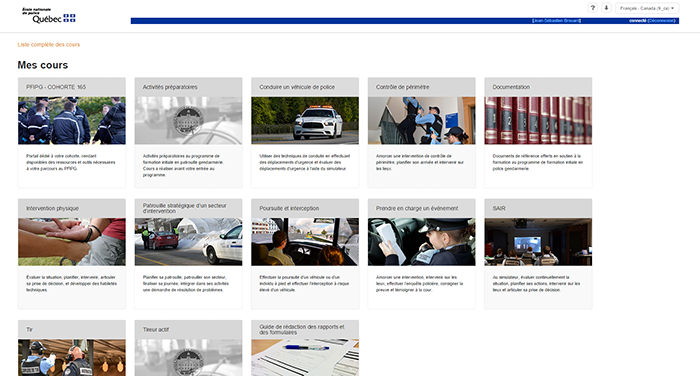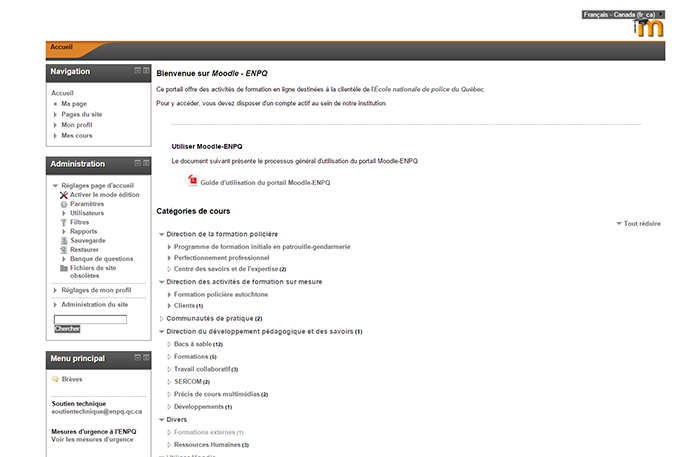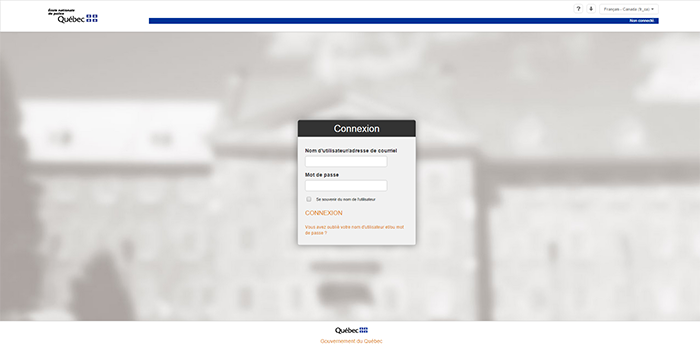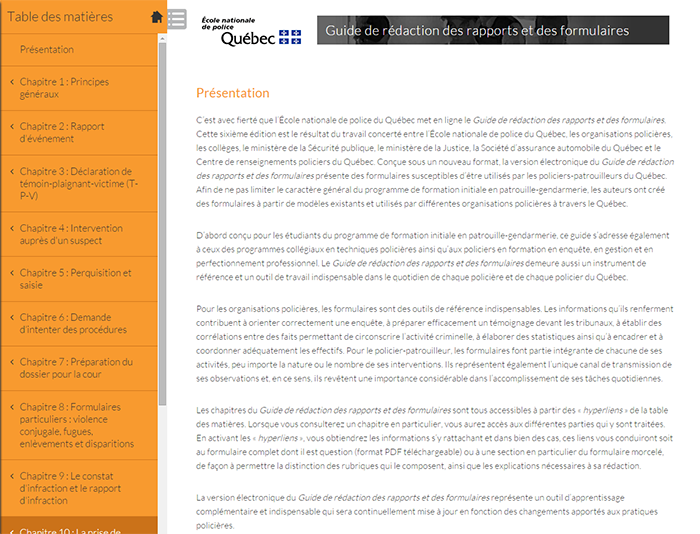Moodle Revisited for Better User Experience and Accessibility
During the winter semester of 2015, Quebec’s Police Academy (École nationale de police du Québec – ENPQ) reimagined its Moodle learning management system with the objective of improving the user experience for its 49,000 users. As IT-REPs (ICT Educational Advisors), my colleague Jean-François Dragon and I went back to the drawing board to look through our entire learning environment with the goal of improving:
- the user experience;
- its appearance;
- its stability; and
- its mobility.
Above all, the work focused on an evolution towards a mobile-friendly version of Moodle for the police officer candidates, their instructors and 48 actors-in-service (yes, you read that correctly) so that they could access multimedia capsules from their mobile devices. It was a logical move, since that training is full of action and simulations. At the time we began this undertaking, a new version of Moodle arrived which ended up facilitating the changes we had in mind. Our dynamic duo was able to concentrate on improving the accessibility of the learning environment and all the elements of the user experience.
Imagine a gigantic file structure that meant a less than user-friendly experience combined with security and archiving issues. An example? A police cadet would have to log in every day to see the prep activities for his or her courses. Initially, they had to:
- Log in to Moodle;
- Choose “DFP ” (Direction de la formation policière);
- Choose “PFIPG” (Programme de formation initiale et patrouille gendarmerie);
- Select “Specific courses”; and then
- Click on “Courses to review.”
Transforming the User Experience
We began with the belief that what appears on a cell phone will also work on a large monitor, but that the opposite was not true. We therefore focused on the mobile-friendly development.
We referred to Google’s guide on designing for mobile devices, entitled Material design. Everything is there to guide you through your deep reflection on how to plan or improve the navigation experience for users. Clearly, we also had to make choices that were feasible in Moodle, which was a major challenge. We were fortunate to work with a web designer while planning the technical design and implementing a new theme in Moodle, which greatly contributed to the success of the project.

Example of visual tabs that allow you to select courses
The results were very interesting! We had an excellent evaluation from the users! We ran a satisfaction survey to gauge their reaction. For all of the clients (cadets in training, active police, teachers and administration), the results were astonishing:
- 90% of the survey respondents provided a positive response to the aesthetic improvements.
- 100% lauded the improvements to the user experience.
In other words, we met the challenge. Here are two screen captures that allow you to compare the old version with the stylings of the new environment.

Prior version of Moodle

New and improved version of Moodle
In another parallel project, we developed an updated version of our Report and Form Writing Style Guide (Guide de rédaction des rapports et formulaires). Here as well we opted to go the multimedia route. The new version of the guide is available on-line in several formats that are friendly for different devices – from desktops to tablets. We will continue to share the guide with all of the colleges offering the Policing Techniques program, starting in September of 2015. The students will find many of the common forms that are actively used within contemporary policing services. These tools, which are essential to police work, are explained, commented and their proper use is illustrated using several examples.

Example of a report/type of content
This web transformation allowed us to integrate all sorts of multimedia content into the same document. Videos, audio captures and appendices of all kinds were integrated into the text. It also allows for continuous updates to policing practices, which is a non-negligible consideration, as the guide can immediately be updated following legal decisions or new jurisprudence. With this tool, teachers from various colleges can build their own courses in a simplified manner (by linking directly to a specific page in the guide, for example), while being reassured that the information is valid.
We are pretty proud of these two development projects that have made the lives of our students and instructors that much easier.
At the ENPQ, creating courses is a team effort with a large number of actors. Each one of the courses is developed:
- By the team at the Centre du savoir et de l’expertise (Centre for Knowledge and Expertise – subject matter experts)
- By the Centre de l’expertise pédagogique et du développement de programme (Centre for Educational Expertise and Program Development – Education Advisors and IT-REP)
- And is then treated by the Édition officielle (Official Editors – with a linguist and a layout person) before being placed in the hands of the instructors that are responsible for its distribution.
The vast majority of training that is offered at the ENPQ is based on an experiential learning approach. The student is submerged in simulations and an authentic environment. The simulations involve 48 actors that participate in a total of 300 hours of simulation per week.
Is there a fall homecoming or back to school for us? Not really! Despite a 5 week hiatus during the summer, we welcome 72 new recruits every five weeks for a duration of 15 weeks. During this training, the students are at the Academy – 24/7.
Our greatest challenge on the horizon is to continue the technological evolution that we have undertaken. In Moodle, our improvements will roll out to all of the courses and resources. Our courses, for their part, must also undergo a multimedia makeover. There are no shortage of projects – we have a ton. From electronic evaluation outside of the classroom to updating our multimedia presentation practices, we will be keeping busy.
Have any questions about our projects? Feel free to get in touch with us.
Jean-Sébastien Brouard: jean-sebastien.brouard@enpq.qc.ca
Jean-François Dragon: jfdragon@enpq.qc.ca

